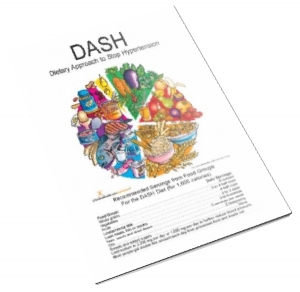Are You Good to Your Heart?
 February is American Heart Month, and to celebrate we're cracking the vault to give you a sneak peek at content that is usually exclusive to our members. If you like what you see, consider signing up for a Communicating Food for Health Membership, which allows you to get access to these resources whenever you want. Heart disease is the leading cause of illness and death in the U.S. Many factors increase your risk of heart disease and heart attack: age, gender, family history, cigarette smoking, high blood cholesterol, high blood pressure, diabetes, obesity, and inactivity. While you cannot control some risk factors, a heart-healthy lifestyle can help decrease others.Take this quiz to evaluate whether you are good to your heart.1. Do you smoke cigarettes?Yes? Consider this: According to the American Heart Association, cigarette smoking more than doubles your chance of having a heart attack. Constant exposure to second-hand smoke also increases your risk of heart disease.2. Do you eat at least 5 servings of fruits and vegetables daily?No? Consider this: Nutrient-dense fruits and vegetables are the key to heart-healthy eating. Diets high in fruits and vegetables are associated with decreased risk of heart disease and high blood pressure (another risk factor). Fruits and vegetables' low calorie and high fiber content can help with weight control, which is useful when it comes to yet another risk factor — obesity. Snacking on fruits and vegetables also helps lower sodium intake.3. Do you eat a variety of whole grains?No? Consider this: Like fruits and vegetables, whole grain breads, cereals, and pastas also play an important role in decreasing your risk of heart disease. They have more nutrients and fiber than their white bread/processed food cousins. And, like fruits and vegetables, a diet high in whole grains leaves less room for foods that add extra calories and fat. Give brown rice and whole grain pasta a try instead of eating their refined counterparts.4. Do you eat fish at least two times per week?No? Consider this: Fatty fish (like salmon, mackerel, bluefish, herring, lake trout, and albacore tuna) are rich in omega-3 fatty acids, which protect against heart disease. You can also get omega-3’s by using canola or soybean oil, ground flax seeds, and nuts like walnuts.5. Do you eat fat-free or low-fat dairy products?No? Consider this: The DASH study found that a diet high in fruits, vegetables, and low-fat dairy products lowers blood pressure. Substitute fat-free or low-fat milk, yogurt, and cheese for higher fat versions of these products.6. Do you drink alcohol more than an average of one drink/day (women) or two drinks/day (men)?Yes? Consider this: While moderate alcohol intake may decrease your risk of heart disease, too much raises blood pressure, can cause heart failure, and contributes to obesity, among other dangers (alcoholism, suicide, accidents). The bottom line: If you drink, limit yourself to one or two drinks per day (for women and men, respectively); if you don’t drink, this is no reason to start.7. Do you eat foods high in soluble fiber, like oats, apples, citrus fruits, and beans?No? Consider this: Soluble fiber can reduce high blood cholesterol levels. Small changes such as having a bowl of oatmeal in the morning, snacking on fruit, and incorporating beans into your meals can help your heart.8. Do you exercise at least three times per week?No? Consider this: Exercise is important in weight control and the prevention of other heart disease risk factors. Aerobic exercise (like walking, running, or swimming) helps burn fat, while strength training helps maintain muscle. Even simple changes (like parking a bit further from the door or taking the stairs instead of the elevator) add up to keep your heart in shape.9. Do you eat lots of processed foods, cook with salt, or add salt at the table?Yes? Consider this: Fast food, convenience foods, and a heavy hand with the salt shaker lead to a high salt intake, which can cause or worsen high blood pressure in most people. If you follow the other heart -healthy guidelines — eating plenty of fruits, vegetables, whole grains, low-fat dairy products, fish, poultry, lean meats, and beans — then your salt intake should go down significantly.10. Do you frequently eat meatless meals?No? Consider this: High fat meats like hamburger and sausage are loaded with saturated fat and cholesterol, which are both bad news for your heart. You’ll get more heart-healthy nutrients, more fiber, and less fat with meatless meals that are based on beans or lentils, vegetables, and rice or pasta. Also choose baked or grilled chicken, turkey, and fish more often than beef.Only you and your doctor can tell if you are good to your heart. And only you can really do something about it!By Hollis Bass, MEd, RDDownload PDF quiz: Quiz: Are You Good to Your Heart? Happy Heart Month! Check out more great heart health resources in the Nutrition Education Store...
February is American Heart Month, and to celebrate we're cracking the vault to give you a sneak peek at content that is usually exclusive to our members. If you like what you see, consider signing up for a Communicating Food for Health Membership, which allows you to get access to these resources whenever you want. Heart disease is the leading cause of illness and death in the U.S. Many factors increase your risk of heart disease and heart attack: age, gender, family history, cigarette smoking, high blood cholesterol, high blood pressure, diabetes, obesity, and inactivity. While you cannot control some risk factors, a heart-healthy lifestyle can help decrease others.Take this quiz to evaluate whether you are good to your heart.1. Do you smoke cigarettes?Yes? Consider this: According to the American Heart Association, cigarette smoking more than doubles your chance of having a heart attack. Constant exposure to second-hand smoke also increases your risk of heart disease.2. Do you eat at least 5 servings of fruits and vegetables daily?No? Consider this: Nutrient-dense fruits and vegetables are the key to heart-healthy eating. Diets high in fruits and vegetables are associated with decreased risk of heart disease and high blood pressure (another risk factor). Fruits and vegetables' low calorie and high fiber content can help with weight control, which is useful when it comes to yet another risk factor — obesity. Snacking on fruits and vegetables also helps lower sodium intake.3. Do you eat a variety of whole grains?No? Consider this: Like fruits and vegetables, whole grain breads, cereals, and pastas also play an important role in decreasing your risk of heart disease. They have more nutrients and fiber than their white bread/processed food cousins. And, like fruits and vegetables, a diet high in whole grains leaves less room for foods that add extra calories and fat. Give brown rice and whole grain pasta a try instead of eating their refined counterparts.4. Do you eat fish at least two times per week?No? Consider this: Fatty fish (like salmon, mackerel, bluefish, herring, lake trout, and albacore tuna) are rich in omega-3 fatty acids, which protect against heart disease. You can also get omega-3’s by using canola or soybean oil, ground flax seeds, and nuts like walnuts.5. Do you eat fat-free or low-fat dairy products?No? Consider this: The DASH study found that a diet high in fruits, vegetables, and low-fat dairy products lowers blood pressure. Substitute fat-free or low-fat milk, yogurt, and cheese for higher fat versions of these products.6. Do you drink alcohol more than an average of one drink/day (women) or two drinks/day (men)?Yes? Consider this: While moderate alcohol intake may decrease your risk of heart disease, too much raises blood pressure, can cause heart failure, and contributes to obesity, among other dangers (alcoholism, suicide, accidents). The bottom line: If you drink, limit yourself to one or two drinks per day (for women and men, respectively); if you don’t drink, this is no reason to start.7. Do you eat foods high in soluble fiber, like oats, apples, citrus fruits, and beans?No? Consider this: Soluble fiber can reduce high blood cholesterol levels. Small changes such as having a bowl of oatmeal in the morning, snacking on fruit, and incorporating beans into your meals can help your heart.8. Do you exercise at least three times per week?No? Consider this: Exercise is important in weight control and the prevention of other heart disease risk factors. Aerobic exercise (like walking, running, or swimming) helps burn fat, while strength training helps maintain muscle. Even simple changes (like parking a bit further from the door or taking the stairs instead of the elevator) add up to keep your heart in shape.9. Do you eat lots of processed foods, cook with salt, or add salt at the table?Yes? Consider this: Fast food, convenience foods, and a heavy hand with the salt shaker lead to a high salt intake, which can cause or worsen high blood pressure in most people. If you follow the other heart -healthy guidelines — eating plenty of fruits, vegetables, whole grains, low-fat dairy products, fish, poultry, lean meats, and beans — then your salt intake should go down significantly.10. Do you frequently eat meatless meals?No? Consider this: High fat meats like hamburger and sausage are loaded with saturated fat and cholesterol, which are both bad news for your heart. You’ll get more heart-healthy nutrients, more fiber, and less fat with meatless meals that are based on beans or lentils, vegetables, and rice or pasta. Also choose baked or grilled chicken, turkey, and fish more often than beef.Only you and your doctor can tell if you are good to your heart. And only you can really do something about it!By Hollis Bass, MEd, RDDownload PDF quiz: Quiz: Are You Good to Your Heart? Happy Heart Month! Check out more great heart health resources in the Nutrition Education Store...




